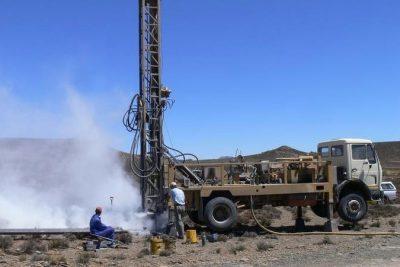So what is happening on the groundwater scene in the Western Cape?
So what is happening on the groundwater scene in the Western Cape?

Marlese Nel, June 2018
The current drought situation in the Cape Town and broader Western Cape areas leaves National- and Local Government no option but to invest in alternative water supply sources. Therefore, the City is planning to abstract 80 million m3 from the Cape Flats aquifer, 30 million m3 from the Atlantis aquifer and 40 million m3 from the TMG aquifer before the end of this year.
The Western Cape Government (through the Department of Transport and Public Works (DTPW)) has put plans in place to ensure that essential facilities continue to function in the event that municipal water becomes severely constrained. The first priority for the Western Cape Government is to make the hospitals water secure and a programme of drilling boreholes at the facilities has already started to augment municipal water supply. The drilling programme is followed by pumping tests to properly assess the performance of a borehole, the borehole yield, the zone of influence of the borehole and to determine the aquifer characteristics. The water supplied by the boreholes is seamlessly integrated into the existing water supply of the hospitals, including Grootte Schuur- and Tygerberg Hospital.
The Premier of the Western Cape, Me. Helen Zille, has also initiated a project to ensure that schools have access to alternative water resources and are not crippled by the likely arrival of Day Zero. Approximately one third of schools in the province already have an existing borehole.
Various private hydrogeological consultants, drillers and academics are involved in these (almost) orchestrated efforts. On the ground, experts and field personnel are collaborating and extending support to each other. Still, these groundwater resource development efforts are a reaction to the water crisis, and not an implementation of previously recommended plans to augment the city’s water supply with groundwater.
In general, the need to become less reliant on National Government for water supply seems to be increasing exponentially. Current groundwater exploration indicates that large industries, factories, businesses, farmers as well as the individual house owner are actively investigating and developing groundwater resources to meet their water demand.
Nice surprises and discoveries along the groundwater flow paths…
The groundwater science continues to amaze and surprise even its practitioners. These are some of the encounters reported by local (some grey) hydrogeologists and also curious bystanders in the last few months:
- The Malmesbury Group within the TMG is an excellent aquifer (once you drill it properly!) and even more surprising is the good water quality associated with it.
- It is possible for a local Municipality, Water User Association, business or factory to become solely dependent on groundwater for water supply.
Groundwater development is happening at an incredible (somewhat alarming) rate in the Western Cape. This is however an excellent opportunity to develop a good, well-referenced hydrogeological database for the province. With the cooperation of the different groundwater users, it can be a remarkable display of sound groundwater monitoring and – management that will lead us well into a water-secure future.